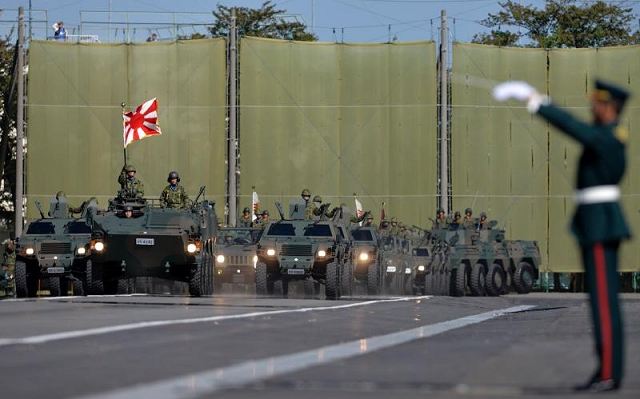| a |
|
Defence & Security News - Japan
|
| |
| |
|
| |
| Wednesday,
December 18, 2013 08:26 AM |
| |
| Japan
to increase defense spending by 5% in the next 5 years to answer China military
power. |
| Japan
on Tuesday, December 17, 2013, approved a plan to increase defense spending
by 5 percent over the next five years to purchase its first surveillance
drones, more jet fighters, naval destroyers, beach-assault vehicles and
troop-carrying aircraft in the face of China's military expansion. |
|

Military armored vehicles participate to the annual military parade of
Japanese Self Defense Force (JSDF) at the Ground Self Defence Force’s
Asaka training ground in Tokyo, Japan, 27 October 2013.
|
|
During the 2014-2019 period,
Japan plans to buy three drones, likely a Global Hawk, as well as 28
F-35A
fighters, 17 MV-22
Osprey aircraft and five destroyers including two with
Aegis anti-ballistic-missile systems. The purchases would cost 24.7
trillion yen ($247 billion), up 5 percent from the previous plan.
The revised 5-year defense plan was adopted by the Cabinet along with
a new national security strategy that reflects Prime Minister Shinzo
Abe's drive to raise the profile of Japan's military and have the country
play a bigger role in international diplomacy and security.
The previous 5-year plan beginning 2011 adopted by the now-opposition
Democratic Part of Japan slashed the defense budget 750 billion yen,
or 3-percent. It also cut forces by 1,000 troops, while the current
plan maintains current troop levels.
The policies, including a five-year military buildup and a 10-year defense
guideline, call for stronger air and maritime surveillance capabilities
and improved ability to defend far-flung islands through such steps
as setting up a marine unit, buying unarmed surveillance drones and
putting a unit of E-2C
early-warning aircraft on Okinawa island in the south.
In the two decades through last year, Japan was the sixth-biggest military
spender, just behind Britain, with outlays rising 13 percent in constant
2011 dollar terms, according to the Stockholm International Peace Research
Institute. By contrast, China's defense spending exploded more than
five-fold, vaulting the country to second place from seventh.
The new defense plan calls for setting up an amphibious unit similar
to the U.S. Marines as part of the ground defense forces to respond
quickly in case of a foreign invasion of those islands. It will also
deploy early warning system, submarines and anti-missile defense system
to step up intelligence in the area.
|
| |




















